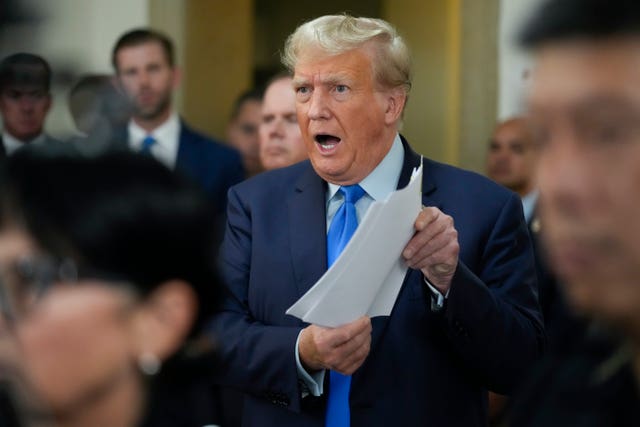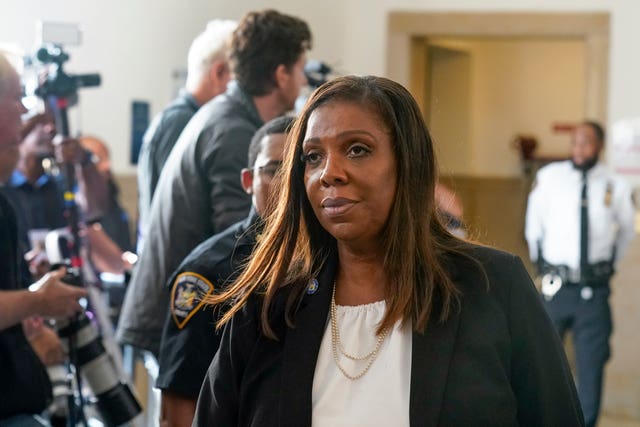A defiant Donald Trump has sat through hours of sometimes testy opening statements in a fraud lawsuit that could cost him control of Trump Tower and other prized properties.
“Disgraceful trial,” he said during a lunch break, after listening to lawyers for New York attorney general Letitia James portray him as a habitual liar.
The state’s lawsuit accuses the business-mogul-turned-politician and his company of deceiving banks, insurers and others by misstating his wealth for years in financial statements.
“They were lying year after year after year,” Kevin Wallace, a lawyer in Ms James’s office, said as Trump sat at the defence table. The former president looked straight ahead, arms crossed, facing away from a screen that showed details of Mr Wallace’s presentation.
Defence lawyers said the financial statements were legitimate. Trump’s holdings are “Mona Lisa properties” that can command top money, lawyer Alina Habba said.
“That is not fraud. That is real estate,” she said, accusing the attorney general’s office of “setting a very dangerous precedent for all business owners in the state of New York”.
Trump voluntarily attended a trial that he called “a scam”, a waste of the state’s time and “a continuation of the single greatest witch hunt of all time”.
The Republican front-runner in the 2024 presidential race reiterated claims that Ms James, a Democrat, is trying to thwart his bid to return to the White House.
“What we have here is an attempt to hurt me in an election,” he said outside court, adding: “I don’t think the people of this country are going to stand for it.”
Trump sneered at Ms James as he passed her on his way out at lunchtime. She left smiling. Meanwhile, his campaign immediately began fundraising off the appearance.
But he left for the day claiming a victory, pointing to comments that he viewed as Judge Arthur Engoron coming around to the defence view that most of the suit’s allegations are too old.
The judge suggested that evidence about Trump’s 2011 financial statement was beyond the legal time limit. Mr Wallace promised to link it to a more recent loan agreement, but Trump took the judge’s remarks as an “outstanding” development for him.
Judge Engoron ruled last week that Trump committed fraud in his business dealings. If upheld on appeal, the ruling could force him to give up New York properties including Trump Tower, a Wall Street office building, golf courses and a suburban estate.

Trump has called it a “a corporate death penalty” and insisted the judge is unfair and out to get him.
The non-jury trial concerns six remaining claims in the lawsuit, including allegations of conspiracy, falsifying business records and insurance fraud.
Judge Engoron said that neither side sought a jury and that state law does not allow for juries when suits seek not only money but a court order setting out something a defendant must do or not do.
James is seeking 250 million dollars (£206 million) in penalties and a ban on Trump doing business in New York.
“No matter how powerful you are, and no matter how much money you think you have, no one is above the law,” she said on her way into court.
Trump denies wrongdoing. He says Ms James and the judge are undervaluing such assets as his Mar-a-Lago resort in Florida, and emphasises that his financial statements had a disclaimer that said they should not be trusted. The yearly snapshots of his holdings were given to banks to secure loans and to financial magazines to justify his place among the world’s billionaires.
The former president, his two eldest sons, Trump Organisation executives and lawyer-turned-foe Michael Cohen are all listed among dozens of potential witnesses.
Trump is not expected to give evidence for several weeks. His trip to court on Monday marked a remarkable departure from his past practice.

“I wanted to watch this witch hunt myself,” he said outside court.
In a recent court filing, Ms James’s office alleged Trump exaggerated his wealth by as much as 3.6 billion dollars (£3 billion).
He claimed his three-story Trump Tower penthouse, with gold-plated fixtures, was nearly three times its actual size and worth 327 million dollars (£270 million), far more than any New York City apartment ever has fetched, Ms James said. He valued Mar-a-Lago as high as 739 million dollars (£611 million) — more than 10 times a more reasonable estimate of its worth, Ms James maintained.
“Every estimate was determined by Mr Trump,” Mr Wallace said in his opening statement.
“They hid their weaknesses and convinced these banks to take on hundreds of millions of dollars in risk. While the defendants can exaggerate to Forbes magazine or on television, they cannot do it while conducting business in the state of New York.”
Trump lawyer Christopher Kise said defence experts will give evidence that assigning values to properties is, by nature, a matter of opinion.
“There is no such thing as objective valuation,” he said in an opening statement.
Any discrepancies in values do not amount to fraud, he added, and disclaimers on the financial statements made clear that these were estimates and that banks would have to perform their own analysis.
Trump and his lawyers have also argued that no one was harmed by anything in the financial statements. Banks that made loans to him were fully repaid, business partners made money, and Trump’s own company flourished.
